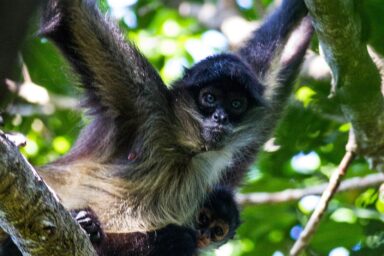PICKS are stories from many sources, selected by our editors or recommended by our readers because they are important, surprising, troubling, enlightening, inspiring, or amusing. They appear on our site and in our daily newsletter. Please send suggested articles, videos, podcasts, etc. to picks@whowhatwhy.org.
Fossil Leaves May Reveal Climate in Last Era of Dinosaurs (Maria)
The author writes, “Embedded in ancient rock is a triangular leaf with rounded upper lobes. It fell from a tree around the time T-Rex and triceratops roamed the Earth, but the plant is instantly recognizable: ginkgo. … What’s special about ginkgo trees is their fossils often preserve actual plant material, not simply an impression. And that thin sheet of organic matter may be key to understanding the ancient climate system — and the possible future of our warming planet.”
Alabama Just Tossed 65,000 Vaccines. Turns Out It’s Not Easy to Donate Unused Doses (DonkeyHotey)
The author writes, “The vast majority of COVID-19 vaccines have gone straight from drug companies to affluent countries such as the United States. Worldwide only about 1% have made it to low-income countries. And here’s what’s happening all across the United States: Millions of vaccine doses at risk of spoiling are sitting on freezer shelves, with no easy way to get them to countries desperately waiting for shots. In North Carolina, for example, more than half a million Pfizer shots are set to expire by the end of August. Alabama just threw away 65,000 doses. Last month, Arkansas said it was going to toss 80,000.”
How the Taliban Turned Smartphones Into Weapons (Russ)
The author writes, “On Aug. 14, a day before armed fighters swarmed into Kabul, a Twitter account for one of the Taliban’s magazine posted a video of six nervous Afghan government soldiers sitting in a truck surrounded by Taliban warriors. The post included a snippet of text, in Pashto, one of the two main languages of Afghanistan: ‘While the mujahedeen behave generously to soldiers, the children of the village threw stones at them and called them dogs. That’s what happens in response to their atrocities.’ The same day, a spokesman for the Taliban posted another Twitter message, this time in English, promising that the group would create ‘a secure environment’ for all diplomats, embassies and nonprofits, both domestic and international. It ended with the Arabic benediction, ‘Inshallah,’ God willing.”
Inside Clarissa Ward’s 19-Hour Days Reporting From Kabul (Dan)
From Esquire: “When CNN’s Clarissa Ward approached a Taliban fighter on the streets of Kabul on Wednesday, a gunshot rang out behind her. If you saw this on Anderson Cooper’s nightly show, you might have missed her flinch. It was brief. Subtle. Her focus remained squarely on the group of Taliban fighters in front of her, including a man who shoved his hand forward to cover her cameraman’s lens and waved a whip made of heavy chain and a padlock. The chaotic scene, he told her, is America’s fault. As he spoke, Ward noticed his eyes. They look dazed, she told me. Was he high, whether from a narcotic or pure adrenaline? She wondered.”
The Airwaves of Navajo Nation (Reader Steve)
From The Verge: “Because Navajo Nation is so large and remote, FM radio remains the territory’s most reliable news source. During the pandemic, two stations broadcast vital information about COVID-19 — and debunked misinformation. But how do you reach listeners who don’t want to hear it?”
Why Are Farmers in Senegal Creating Gardens That Look Like Crop Circles? (Mili)
From Atlas Obscura: “From the air, the new garden in the town of Boki Diawe, in northeast Senegal, looks like an eye: wide open, unblinking, and flanked by a smattering of divots dug in the surrounding soil, dark like freckles across a nose. The ground is still sandy brown, but nearby, there is a fringe of bright green. If all goes according to plan, this garden will soon look similarly lush. The circular garden — known locally as a tolou keur — has recently been planted with papayas, cashews, lemons, and more. One of the inner curving rows is dedicated to medicinal plants, while the outer row has been lined with baobabs and Khaya senegalensis, whose wood is also known as African mahogany.”
Millions of Electric Car Batteries Will Retire in the Next Decade. What Happens to Them? (Inez)
The author writes, “A tsunami of electric vehicles is expected in rich countries, as car companies and governments pledge to ramp up their numbers — there are predicted to be 145m on the roads by 2030. But while electric vehicles can play an important role in reducing emissions, they also contain a potential environmental timebomb: their batteries. By one estimate, more than 12m tons of lithium-ion batteries are expected to retire between now and 2030. Not only do these batteries require large amounts of raw materials, including lithium, nickel and cobalt — mining for which has climate, environmental and human rights impacts — they also threaten to leave a mountain of electronic waste as they reach the end of their lives.”
Sea Snakes ‘Attacking’ Divers Are Just Trying to Get Laid, Scientists Say (Dana)
The author writes, “Sea snakes that have long been known to ‘attack’ human divers are probably just on the prowl for sex, according to the authors of a new scientific paper. To back up a little bit, yes, sea snake incidents are something that can happen. A venomous creature known as the olive sea snake, which inhabits tropical coral reefs and can grow up to 6 feet long, has been reported to have attacked human divers ‘unprovoked’ ― which, even if the snake doesn’t bite, can put divers in danger by understandably throwing them into a panic, note the researchers in the paper, published in Scientific Reports on Thursday.”



